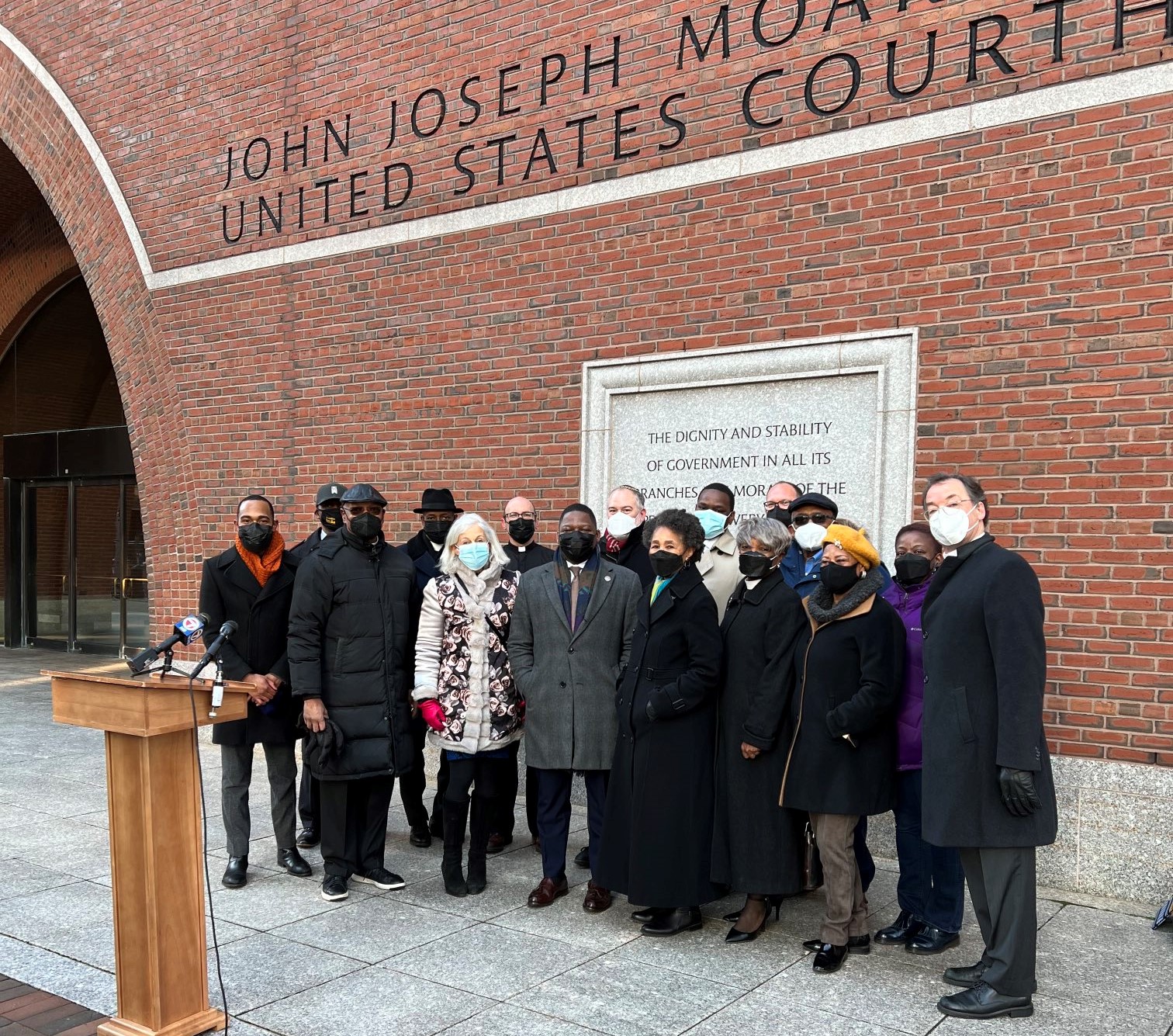 With clergy at the Moakley Courthouse
With clergy at the Moakley Courthouse
This past week, after much delay, Rachael Rollins was installed as the new U.S. Attorney for Massachusetts. You may have seen some media in recent weeks about concerns for her personal safety, along with that of her family, in the wake of many threats she has received (an unfortunately not atypical experience for women, and women-of-color in particular, in high office).
A few weeks ago – coming back online after Shabbat – there was a message for me from a pastor who has been a long-time friend and ally: will you sign a letter with several pastors, and ask rabbis to join you, calling on the Attorney General to address Rollins’s security needs? And, we need an answer by Sunday.
We’ve got our own process at JCRC on responding to allies. We quickly consulted some of our members and huddled with our executive committee that night. We had some questions about some of the letter’s framing; but there was no question we would respond affirmatively to our partner. I called the pastor and told him that yes, I would sign the letter. We also reached out to our network of rabbis, many of whom signed on enthusiastically within that short window. The Boston Globe reported on that letter last week; and again, on short turnaround, well after 10pm on Wednesday night, another ask came from the pastors, to join a media event at the Moakley Courthouse, outdoors, in the bitter cold the next day.
There was no hesitation on my part. I cleared my calendar and I went. I was proud to be there – along with Rabbi Elaine Zecher of Temple Israel in Boston – together with several ministers, many of whom we’ve been in deep relationship, and some of whom are relatively recent acquaintances.
When I spoke, I evoked the very recent memories of how Rollins was the first public leader to show up when Rabbi Noginski was brutally attacked in Brighton last summer; how she stood with us that first morning after and unequivocally characterized this assault as an act of antisemitism. She asserted that people needed to be held accountable, made an example of, and pursued through a civil rights investigation. DA Rollins has our back, I said, and we have her back in the face of the threats she is now receiving.
Afterwards, one of the pastors with whom I am close, commented that I must have had to navigate some complexity to show up here, given that he knows that the Jewish community is not of one mind about some of Rollins policy agenda. Not at all, I replied. This one was an easy call.
And therein why I tell you all this. Because standing up for our U.S. Attorney in this moment wasn’t easy because it “was the right thing to do” (though it was the right thing to do). It was easy because of the relationships involved. It was easy because she’s had our back when we needed her, yes. But also because of the relationships with these ministers, many of whom have shown up for us time and time again over the years at the drop of a hat. Some of whom I’ve been privileged to bear witness to as they navigated their own complexities in order to stand with the Jewish community. Because we’ve built relationships together that have fostered trust between us, even when we disagree; relationships of obligation and accountability that also catalyze our ability to do more for each other.
What I’m thinking about going into Martin Luther King Day, is not about any one specific policy change – though those are certainly important – to address the still incomplete work that he challenged us to do. It is, rather, about how we must be together with each other; the fostering of our obligations to each other to do that work, and more. It’s the weaving of the connections to others and not being “just” of and for our own communities. Connections that move us from a culture of many siloed communities to being one community; that obligate us to each other – as leaders and citizens – and that challenge ourselves to do the things that are hard.
This is not easy work. These relationships take time, years of honest and often hard conversations, of real listening, and of showing up for each other in all sorts of ways. But the benefits are mutual, empowering, and transformative.
Recommitting to the hard road that leads, eventually, to transformation; isn’t that what this weekend is about?
I hope you’ll join us in that commitment and that work.
Shabbat Shalom,
Jeremy
Jeremy Burton, JCRC Executive Director
p.s. If it is in keeping with your Shabbat practice, U.S. Attorney Rachael Rollins will be making one of her first public appearances in her new role tonight at Temple Israel in Boston. She will be the guest speaker at their annual Shabbat Tzedek service. The community is invited.




